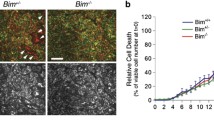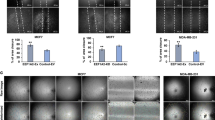Abstract
Overexpression of the normal p53 protein in tumor cell lines is known to induce apoptosis and a potential mediator of this response is the apoptotic inducer, Bax. The expression of Bax mRNA products were investigated in the ECV-304 endothelial cell tumor line and primary human umbilical vein endothelial cells (HUVEC) that were induced to overexpress the p53 protein. Induction of p53 in ECV-304 and HUVEC cells was mediated by infection with a p53 recombinant adenovirus (AdCMV-p53). The expression of Bax transcripts in p53-induced cells was investigated by reverse-transcription polymerase chain reaction (RT-PCR). The Baxα mRNA species was detected in both ECV-304 and HUVEC cells. Surprisingly, Baxα expression was reduced several-fold in ECV-304 endothelial cells overproducing p53 and no change in Baxα was detected in HUVEC cells after induction of p53. However, the Baxδ spliced transcript was observed to be induced by p53 in the ECV-304 tumor cell line. Baxα was the predominant species expressed in normal human endothelial cells but, in contrast to the immortalized ECV-304 endothelial cell line, induction of p53 failed to alter the expression of Baxα or to induce any other Bax transcripts. HUVEC cells were more resistant to p53, since at least 80% of the HUVEC cell population survived the overexpression of p53 after 24 h of infection with AdCMV-p53. An ECV-304-derived cell line (DECV) resistant to p53-mediated apoptosis did not show any changes in expression of Bax mRNA products, even in the presence of high levels of p53. ECV-304 endothelial cells that expressed the Baxδ species underwent apoptosis much more rapidly and more extensively after induction of p53, suggesting that the Baxδ species enhances p53-mediated apoptosis.
Similar content being viewed by others
References
Bowen ID. Apoptosis or programmed cell death? Cell Biol Int 1993; 17: 365–380.
Williams JT, Smith CA. Molecular regulation of apoptosis: genetic controls on cell death. Cell 1993; 74: 777–779.
Thompson CB. Apoptosis in the pathogenesis and treatment of disease. Science 1995; 267: 1456–1462.
Tsujimoto Y, Croce C. Analysis of the structure, transcripts, and protein products of bcl-2, the gene involved in follicular lymphoma. Proc Natl Acad Sci USA 1986; 83: 5214–5218.
Yin X-M, Oltvai ZN, Korsmeyer J. BH1 and BH2 domains of Bcl-2 are required for inhibition of apoptosis and dimerization with Bax. Nature 1994; 369: 323–322.
Boise LH, Gonzalez-Garcia M, Postema CE, et al. Bcl-x, a Bcl-2-related gene that functions as a dominant regulator of apoptotic cell death. Cell 1993; 74: 597–608.
Sedlak TW, Oltvai ZN, Yang E, et al. Multiple Bcl-2 family members demonstrate selective dimerizations with Bax. Proc Natl Acad Sci USA 1995; 92: 7834–7838.
Korsmeyer SJ, Shutter JR, Veis DJ, Merry DE, Oltvai ZN. Bcl-2/bax—a rheostat that regulates an anti-oxidant pathway and cell death. Seminars Cancer Biol 1993; 4: 327–332.
Oltvai ZN, Milliman CL, Korsmeyer SJ. Bcl-2 heterodimerizes in vivo with a conserved homolog, Bax, that accelerates programmed cell death. Cell 1993; 74: 609–619.
Knudson CM, Tung KSK, Tourtellotte WG, Brown GAJ, Korsmeyer SJ. Bax deficient mice with lymphoid hyperplasia and male germ death. Science 1995; 270: 96–99.
Nguyen M, Branton P, Walton PA, Oltvai ZN, Korsmeyer SJ, Shore GC. Role of membrane anchor domain of bcl-2 in suppression of apoptosis caused by e1b-defective adenovirus. J Biol Chem 1994; 269: 16521–16524.
Yin XM, Oltvai ZN, Korsmeyer SJ. BH1 and BH2 domains of Bcl-2 are required for inhibition of apoptosis and heterodimerization with Bax. Nature 1994; 369: 321–323.
Miyashita T, Krajewski S, Krajewski M, et al. Tumor suppressor p53 is a regulator of bcl-2 and bax gene expression in vitro and in vivo. Oncogene 1994; 9: 1799–1805.
Miyashita T, Reed JC. Tumor suppressor p53 is a direct transcriptional activator of the human bax gene. Cell 1995; 80: 293–299.
Apte SS, Mattei M-G, Olsen BR. Mapping of the human Bax gene to chromosome 19q13.3–q13.4 and isolation of a novel alternatively spliced transcript, Baxδ. Genomics 1995; 26: 592–594.
Zhang WW, Fang X, Branch CD, Mazur W, French BA, Roth, J.A. Generation and identification of recombinant adenovirus by liposome-mediated transfection and PCR analysis. Biotechniques 1993; 15: 868–872.
Takahashi K, Sawasaki Y, Hat J-I, Mukai K, Goto T. Spontaneous transformation and immortalization of human endothelial cells. In Vitro Cell Dev Biol 1990; 25: 265–274.
Mitsudomi T, Steinberg SM, Nau MM, et al. p53 gene mutations in non-small cell lung cancer cell lines and their correlation with the presence of ras mutations and clinical features. Oncogene 1992; 7: 171–180.
Hudson JM, Frade R, Bar-Eli M. Wild-type p53 regulates its own transcription in a cell-type specific manner. DNA Cell Biol 1995; 14: 759–766.
Slichenmyer WJ, Nelson WG, Slebos RJ, Kastan MB. Loss of a p53-associated G1 checkpoint does not decrease cell survival following DNA damage. Cancer Res 1993; 53: 4164–4168.
Delmolino L, Band H, Band V. Expression and stability of p53 protein in normal human epithelial cells. Carcinogenesis 1993; 14: 827–832.
Author information
Authors and Affiliations
Rights and permissions
About this article
Cite this article
Maxwell, S.A., Acosta, S.A. & Davis, G.E. Induction and alternative splicing of the Bax gene mediated by p53 in a transformed endothelial cell line. Apoptosis 4, 109–114 (1999). https://doi.org/10.1023/A:1009618811038
Issue Date:
DOI: https://doi.org/10.1023/A:1009618811038




